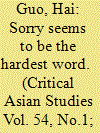|
|
|
Sort Order |
|
|
|
Items / Page
|
|
|
|
|
|
|
| Srl | Item |
| 1 |
ID:
184148


|
|
|
|
|
| Summary/Abstract |
Korean–Japanese marriages were common during and after Japan’s imperial rule of Korea. Following the Japanese Empire’s demise, however, Japanese wives in Korean families faced new political dynamics and their ethnic belonging became an issue. This article introduces the experiences of some Japanese women who married leftist zainichi Korean men in the 1950s and 1960s, obtained through interviews and published memoirs. Their self-identification exclusively as members of the zainichi Korean community – or their experiences of “becoming Korean,” despite facing oppression in both the Korean community and Japanese society reflect the specific historical moment of Korean decolonization in post-imperial Japan. Their stories attest that Koreans’ efforts toward decolonization led to the establishment of an autonomous ethnic sphere and a new center of moral authority among zainichi Koreans. These women stood at the boundary between Korean and Japanese social spheres, which developed based on the malleability in women’s senses of ethnic and national belonging. Recovering their experiences can help us integrate post-imperial tensions and decolonization into the history of postwar Japanese society.
|
|
|
|
|
|
|
|
|
|
|
|
|
|
|
|
| 2 |
ID:
184146


|
|
|
|
|
| Summary/Abstract |
This paper provides a bottom-up analysis of law in daily life in Vietnam through an empirical study of low-income residents’ engagement in illegal housing activities in a peri-urban area of Ho Chi Minh City. Different from most existing studies of law and social change which take the formal institutional framework of law as their starting point, this paper examines the uses and meanings of law as products of interactions between citizens, local authorities, and intermediary actors. From an in-depth analysis of the residents’ stories, it argues that the role of law within daily life in Vietnam must be understood through the enactment of two opposing, but mutually connected, forms of legality. One form emphasizes informality and sentiment, while the other emphasizes violence and intimidation. The former accommodates and answers to people’s survival needs, while the latter constrains if not suppresses those needs. These forms of legality are mutually connected because they unfold in an ambiguous area of law enforcement that is largely subject to local authorities’ arbitrary discretion. These findings allow for a conceptualization of everyday legality in which law is both manipulable and emancipatory, but also disadvantageous and sanctioning.
|
|
|
|
|
|
|
|
|
|
|
|
|
|
|
|
| 3 |
ID:
184145


|
|
|
|
|
| Summary/Abstract |
Since the demise of Suharto’s New Order in 1998, many observers have noted the growing influence of political Islam in Indonesia, despite its peripheral presence in national politics. A notable development was an unprecedented surge in the influence of Islamists during the 2019 presidential election campaign, many of whom were known for their intolerance of religious minorities. What ideological appeal drove Islamists into unprecedented collective action for the first time since 1998? This paper sheds light on the historical trajectory of the Masyumi and an organization called Dewan Da’wah Islamiyah Indonesia (the Indonesian Islamic Propagation Council). More specifically, via an analysis of their discursive efforts, it shows that rather than sectarian exclusivism which has long characterized political Islam in Indonesia, historically embedded anti-authoritarian efforts developed by their predecessors during the Sukarno and Suharto regime have enabled Islamists to engage in collective actions and attract the support of many ordinary Muslims. However, such collective action will not last because they have lost the shared aspirations of their predecessors for an alternative political system.
|
|
|
|
|
|
|
|
|
|
|
|
|
|
|
|
| 4 |
ID:
184147


|
|
|
|
|
| Summary/Abstract |
This article explores how local Chinese authorities employed various strategies to promote the Patriarch of Sanping’s cult in post-Mao China from 1979 to 2015. It argues that the cult of the Patriarch of Sanping became an invented tradition for expanded religious tourism in Pinghe County in Zhangzhou, Fujian Province. Local state agents employed various placemaking strategies to promote Sanping Monastery and endorse the deity’s efficacy, creating an opportunity for resources to be channeled from other parts of China, Taiwan, and overseas Chinese communities to develop Pinghe County. This study shows that, on the one hand, local state agents have propagated miracle tales to entice devotees to visit and make donations to this monastery while, on the other hand, they have courted scholars, journalists, and tour guides to generate attention and interest in the cult. Overall, this article demonstrates how local government placemaking and marketing strategies have contributed to the transformation of a Buddhist master from a local deity to a popular god in contemporary China.
|
|
|
|
|
|
|
|
|
|
|
|
|
|
|
|
| 5 |
ID:
184143


|
|
|
|
|
| Summary/Abstract |
This article examines nalehmu, a set of informal relational practices for negotiating power across scales which have facilitated access and enforced accountability through mutually recognized norms and social sanctions in Myanmar. Like Asef Bayat’s “quiet encroachment” in the Middle East, nalehmu is Myanmar’s discreet and prolonged practice of agency that has enabled ordinary people to survive and better their lives despite the multiple ruptures in Myanmar’s history, as seen most recently in the February 2021 coup d’état. The paper analyzes how nalehmu serves as a hidden-in-plain-sight social infrastructure across three different scales: relations of mutuality, obligation, and reciprocity between individuals; implicit connections for accessing goods, services, and recognition; and a means of interacting with the state via the nalehmu economy. This analysis seeks to do more than add a different case to studies of urban Southeast Asia, but also to help produce further theorization that takes seriously the actually existing contexts and practices in the global South.
|
|
|
|
|
|
|
|
|
|
|
|
|
|
|
|
| 6 |
ID:
184149


|
|
|
|
|
| Summary/Abstract |
The 2019 Anti-Extradition Law Amendment Bill protests in Hong Kong culminated in diverse forms of political participation, but as yet little attention has been paid to the impact on the pro-democracy movement at the micro-level. This paper explores pro-democracy protesters’ evolving views of politics and their new modes of political participation during and after the protests. Using interview data, this paper shows that participants in the pro-democracy movement have increasingly recognized the inseparable relationship between everyday life and political life. This paper examines two forms of everyday political participation – political consumption and digital activism – that have been widely deployed by protesters to express political claims, circulate political information, and garner support from local and international audiences. While the politicization of everyday life provided impetus to street demonstrations in 2019, it has continued despite the adoption of a wider scope of repressive measures by the Chinese and Hong Kong governments after the protests. Through the case of Hong Kong, this paper demonstrates how, in an authoritarian context, everyday resistance is applied to struggle for regime change and democratization.
|
|
|
|
|
|
|
|
|
|
|
|
|
|
|
|
| 7 |
ID:
184144


|
|
|
|
|
| Summary/Abstract |
Conventional arguments understand history-related disputes between Japan and China to be a result of identity politics that revolve around very different interpretations over the historical legacies of WW II. This article challenges these conventional arguments. It shows that history-related disputes between the two sides have less to do with identity politics than with efforts by the Chinese government to deflect domestic discontent over its 1972 decision to waive reparations claims against Japan in return for the Japanese government apologizing for Japan’s actions in WW II. But this tacit arrangement, “the 1972 System,” began to fall apart in the early 1980s. This is because it failed to establish a clear institutional framework that could provide historical justice to Chinese citizens for the actions of the Japanese military in China, embroiled the Chinese government in a chronic legitimacy deficit that can only be mitigated if Japan keeps apologizing, and perpetuated Japan’s victimizer identity, which the Japanese public has found emotionally unacceptable. The result is the transformation of what originally was a domestic controversy in China over historical justice into a diplomatic dispute with Japan over historical understanding.
|
|
|
|
|
|
|
|
|
|
|
|
|
|
|
|
|
|
|
|
|